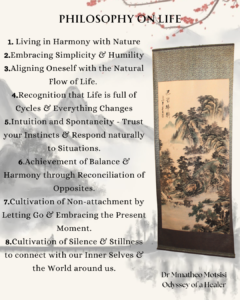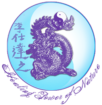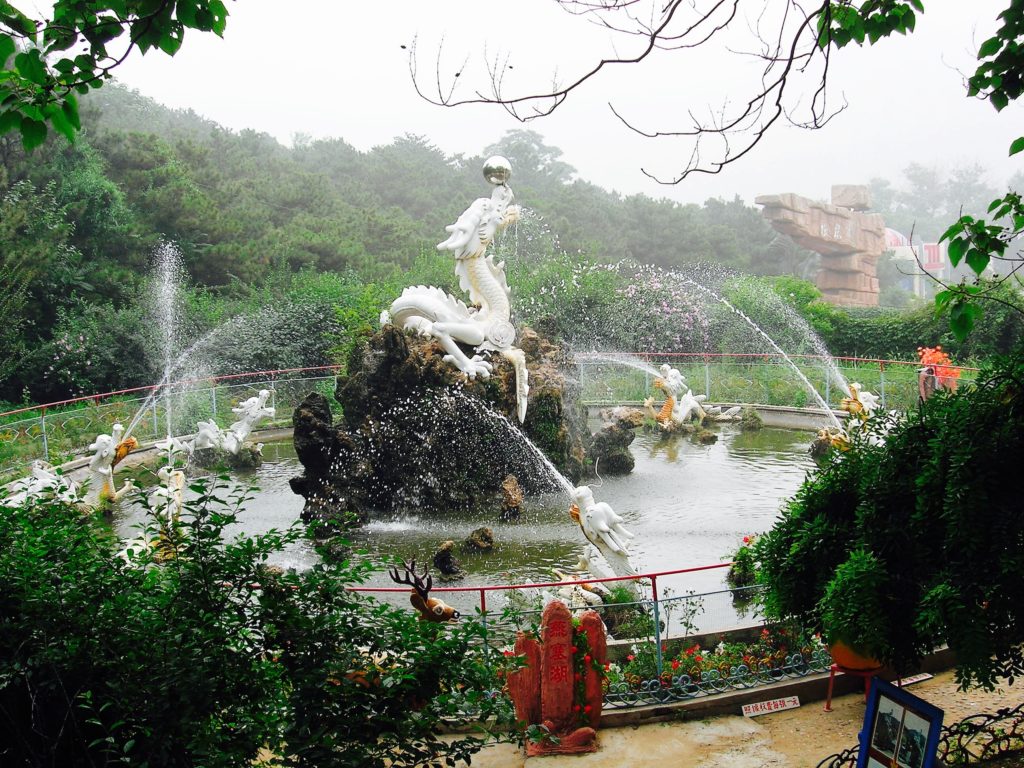Lao Tzu (also known as Laozi) was a Chinese philosopher and poet who founded Taoism. His philosophy on life is centered around the concept of the Tao (the Way), which refers to the ultimate reality, the natural order or cyclical nature of life, and the path to enlightenment.
The cyclical nature of life, as symbolized by the Four Seasons, offers a profound way to understand the flow of existence through the lens of Lao Tzu’s teachings.
Spring: Birth and Beginnings (Growth)
- Lao Tzu’s Wisdom: “The Tao is like a well: used but never used up. It is like the eternal void: filled with infinite possibilities.” (Tao Te Ching, Chapter 4)
Spring is the season of renewal, where life begins to awaken from the dormancy of winter. The fresh sprouts, blooming flowers, and the return of warmth reflect the infinite possibilities that Lao Tzu speaks of. It’s a time of potential, growth, and new beginnings. Just as the Tao is an ever-flowing source of life, spring represents the endless potential within the cycle of life, where each beginning is connected to the greater whole.
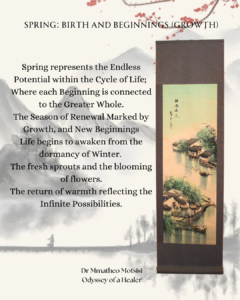
Summer: Maturity and Abundance (Flourishing)
- Lao Tzu’s Wisdom: “The great Tao flows everywhere. All things are born from it, yet it doesn’t create them. It pours itself into its work, yet it makes no claim.” (Tao Te Ching, Chapter 34)
Summer, a season of abundance and maturity, mirrors the Tao’s flowing nature. It’s a time of flourishing, where life is at its peak, and the energy of creation is most visible. Lao Tzu’s teaching reminds us that while life is full and vibrant, it is not to be held onto possessively. The Tao nourishes without claiming ownership, just as summer’s abundance is shared freely, and growth is seen in its fullest expression.
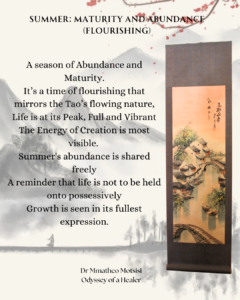
Autumn: Harvest and Reflection (Reaping)
- Lao Tzu’s Wisdom: “Fill your bowl to the brim and it will spill. Keep sharpening your knife and it will blunt. Chase after money and security and your heart will never unclench.” (Tao Te Ching, Chapter 9)
Autumn is a time of harvest, a period to gather the fruits of one’s labor and reflect on the journey. Lao Tzu’s teaching warns against excess and encourages a balance between what is harvested and what is left behind. In autumn, there is a recognition that all things must return to balance, and that holding on too tightly can lead to loss. This season is a reminder to live with moderation and gratitude, understanding that what we reap is a natural result of the flow of life.
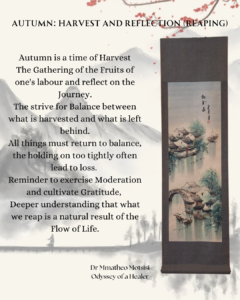
Winter: Rest and Renewal (Retreat)
- Lao Tzu’s Wisdom: “Be still like a mountain and flow like a great river.” (Tao Te Ching, Chapter 15)
Winter represents a time of rest, retreat, and renewal. Life withdraws into itself, resting in stillness and preparing for the next cycle. Lao Tzu’s wisdom teaches us to embrace this stillness, to find strength in quietude and to trust the flow of life even in times of seeming inactivity. Winter is a period of contemplation, where the seeds of the future lie dormant, gathering strength for the rebirth in spring.
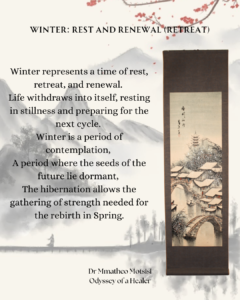
The Eternal Cycle
Lao Tzu’s teachings emphasize the importance of harmony with the natural flow of life. The Four Seasons reflect the Tao’s eternal cycle—birth, growth, maturity, and rest—which is a continuous process of transformation. Understanding this cycle helps us align with the rhythms of life, recognizing that each phase has its purpose and place within the greater whole.
By embracing the wisdom of Lao Tzu and the symbolism of the seasons, we learn to live in harmony with the natural world, accepting the flow of change, and finding peace in the cyclical nature of life.
Here are some key aspects of Lao Tzu philosophy:
These principles offer a unique perspective on life, encouraging us to cultivate a deeper understanding of ourselves and the world, and to live in harmony with the natural order.
- Living in Harmony with Nature: Lao Tzu believed that humans should live in balance and harmony with the natural world, rather than trying to control or dominate it.
- Embracing Simplicity and Humility: He advocated for a simple, humble, and non-competitive way of life, free from desires and ego.
- The Power of Non-action (wu-wei): Lao Tzu introduced the concept of wu-wei, which means taking action without forcing or controlling. It’s about aligning oneself with the natural flow of life.
- Cycles and Impermanence: He recognized that life is full of cycles and changes, and that everything is impermanent. This understanding can help us cultivate acceptance and detachment.
- The importance of Intuition and Spontaneity: Lao Tzu valued intuition and spontaneity, encouraging individuals to trust their instincts and respond naturally to situations.
- Balance and Polarity: He saw the world as a dynamic interplay of opposites (yin-yang), and believed that balance and harmony can be achieved by embracing and reconciling these contradictions.
- Non-attachment and Letting Go: Lao Tzu taught that attachment to things, outcomes, and desires can lead to suffering. He encouraged letting go and embracing the present moment.
- The value of Silence and Stillness: He believed that silence and stillness can help us connect with our inner selves and the world around us.
